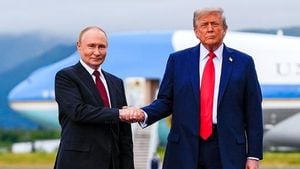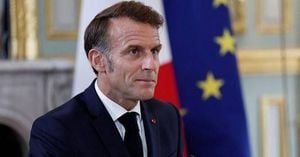A significant debate has emerged among Canadian leaders as both Alberta Premier Danielle Smith and Ontario Premier Doug Ford advocate for reconsidering Mexico's role within the North American trade agreement. This mounting pressure arises as concerns about Mexico's trade practices, especially involving China, become increasingly prominent.
During recent discussions, Premier Smith agreed with Ford's proposition to evaluate the possibility of eliminating Mexico from the trilateral agreement known as the Canada-United States-Mexico Agreement (CUSMA), arguing it could pave the way for more favorable bilateral trade deals with the U.S. Ford raised the issue by highlighting Mexico's weakening labor standards and its perceived facilitation of Chinese imports which, he claims, are undermining both Canadian and American jobs.
"The real issue we have is not just the trades, but the competitive stance Mexico has with the U.S. and Canada," remarked Smith on the political talk show Power & Politics. "A thousand percent," she asserted when asked if she echoes Ford’s sentiment, emphasizing the need for Canada to avoid "sacrificing" its relationship with the U.S. if Mexico continues to act as a “trade irritant.”
Ford articulated his disappointment, asserting Mexico has allowed itself to become what he termed “a backdoor” for Chinese products entering North American markets, particularly emphasizing the auto industry. During this dialogue, he posited reestablishing the pre-NAFTA bilateral trade agreement, invalidated since the 1994 implementation of NAFTA, as the preferred route for Canada moving forward.
Ford expressed, "If Mexico won’t at least match Canadian and American tariffs on Chinese imports, they shouldn’t have a seat at the table or enjoy access to the largest economy in the world." He criticized Mexico’s role, claiming its trade policies have resulted in Canadian and American workers being undercut and unfairly disadvantaged.
Smith believes the current dynamics necessitate action, as both Premier highlighted the potential for new U.S. tariffs under the incoming Trump administration. With Trump promising to impose tariffs on imports, with rates as high as ten percent, Canadian officials are becoming increasingly concerned about how such tariffs could impact both Canada and its economic relationship with the U.S.
On the flip side, U.S. President-elect Donald Trump's administration seems poised to engage Mexico’s current trade policies directly, which has prompted Trudeau to assure American partners of Canada’s alignment and commitment to trilateral negotiations. Trudeau underscored the importance of working within the framework of CUSMA, indicating he remains hopeful for productive discussions with both the U.S. and Mexico.
At the recent Asia-Pacific Economic Cooperation (APEC) summit, Trudeau, upon his return from Lima, Peru, insisted on the necessity to maintain strong trading relationships across North America, reiterate the validity of Mexico as a solid trading partner, but recognized the increasing American concerns over Mexico’s approach to trade.
Despite Smith and Ford’s backing of their hardline stance on trade, some political commentators caution against provoking Mexico unnecessarily. Derek Burney, who worked under former Prime Minister Brian Mulroney during the original NAFTA negotiations, expressed his belief this push to exclude Mexico would be exceedingly “childish.” Burney noted Mexico is already facing considerable pressures and issues from the U.S. without Canada's interference.
Both sides remain wary, as Deputy Prime Minister Chrystia Freeland acknowledged hearing apprehensions from the outgoing Biden administration and the incoming Trump’s transition team about Mexico's position related to China. Freeland characterized these concerns as valid and one she shares personally.
Trudeau’s administration continues to strive for bilateral agreements beneficial for all involved parties, emphasizing cooperation over division. The fate of NAFTA and its successors hangs in the balance as leaders brace for negotiations set for 2026, which will undoubtedly shape the future of trade across North America going forward. Issues surrounding Chinese investment, economic alignment, labor standards, and tariffs will dominate discussions as all parties attempt to navigate the complex trade negotiations.
With the stakes this high, the coming months will likely see negotiations become even more heated, as provinces voice their concerns and advocate for their own interests, all the whilst considering how best to position Canada within the intricacies of North American trade.



